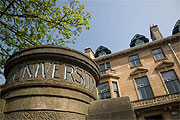Source: Wikimedia Commons
Notable People
Sir Henry Campbell-Bannerman
-
Henry Campbell-Bannerman

-
Henry Campbell-Bannerman's library register record - detail from page, 1852

Source: University of Glasgow
-
Henry Campbell-Bannerman's library register record - full page, 1852

Source: University of Glasgow
Prime Minister
Born 7 September 1836, Glasgow, Scotland.
Died 22 April 1908.
British Prime Minister 1905-1908
Connection to the University of Glasgow: Alumnus, Graduate, Honorary Graduate
GU Degree: LLD, 1883;
Achievements
The following achievement is associated with Sir Henry Campbell-Bannerman:
Prime minister 1905-1908
As Prime Minister, Sir Henry Campbell-Bannerman introduced legislation to ensure trade unions could not be liable for damages incurred during strike action and to provide free school meals for children.
Honours
The following honours are associated with this person:
Biography
Sir Henry Campbell-Bannerman (1836-1908) was an alumnus of the University and Prime Minister from 1905-1908. He was Leader of the Liberal Party from 1899-1908. He became a Member of Parliament for the Stirling Burghs in 1868, a position which he held for 40 years. He died at 10 Downing Street on the 22nd April 1908.
Henry Campbell was born at Kelvinside House near Glasgow on the 7th September 1836. His father, James was Lord Provost of Glasgow from 1840-1843. He acquired his additional surname, Bannerman, in 1871 when he inherited the estate of his maternal uncle, although he preferred to be known simply as CB. He was educated at Glasgow High School from 1847-1850 and matriculated to study at the University in 1851. He studied Greek in session 1851-1852 and Logic in 1852-1853, and won a number of prizes, including the Cowan gold medal in 1853 for excelling at the Blackstone examination in Greek. He continued his studies at Trinity College, Cambridge, receiving a third class degree in classics in 1858. He also received an LLD from the University in 1883 for his services as an MP in Stirling.
After graduating he joined the family business and became a partner in 1860. However, his interests lay in politics and he was keen to pursue a career as a member of parliament. After becoming an MP for Stirling Burgh in 1868 Campbell, Bannerman was appointed Financial Secretary for the War Office, between 1871-1874 and 1880-1882, and Chief Secretary for Ireland in 1884-1885. He was Secretary of State for War in 1886 and again in 1892-1895. He took leadership of the Liberal Party in 1898 and became Prime Minister in December 1905 when Arthur Balfour resigned.
He was awarded a knighthood in 1895 (Knight Grand Cross in the Order of the Bath).

